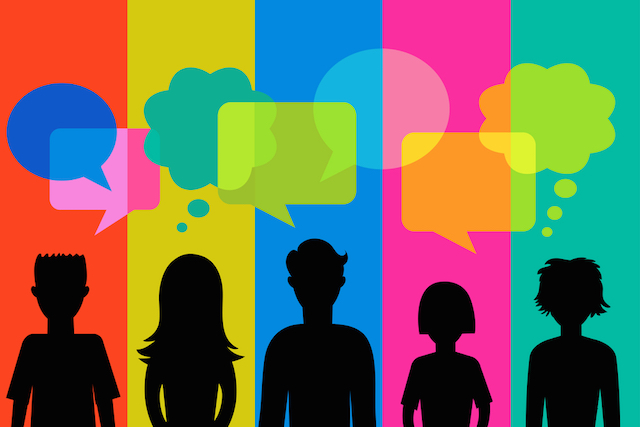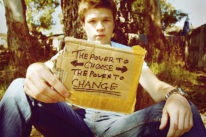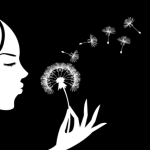
“The reason we struggle with insecurity is because we compare our behind-the-scenes with everyone else’s highlight reel.” ~Steve Furtick
Social media is not a full (or even sometimes real) portrayal of someone’s life. If you forget this, you fall into the trap of comparing your life to what someone else chooses to share.
This is dangerous.
Comparing can lead to feelings of inadequacy, envy, and even hatred toward others. These kinds of feelings, if left un-dealt with, can lead to stress, anxiety, and depression. Or, if you are a person who already struggles with anxiety or depression, having these kinds of negative thoughts all the time could make it even worse.
I used to struggle with low self-esteem and negative thoughts. I didn’t deal with this and ended up having severe anxiety and depression. My life was turned upside down. I had panic attacks daily and felt overwhelmed almost every single day.
I let it get unbearably bad before I did anything about it. When I did decide to make a change, I did a number of different things in order to take control back of my life. One of those things included committing to a consistent mindfulness and meditation practice.
My health and life literally depended on me learning how to be more positive and mindful, and social media wasn’t helping.
As I started to become more and more aware, I realized that there was a lot of negativity consuming me from being online all the time. All those images of perfect bodies, perfect friendships, and perfect relationships were leading me to assume that my life wasn’t perfect.
I was always thinking in terms of lack, what I didn’t have, and what everyone else seemed to have.
Thinking like this all the time made me sick, in the literal sense.
My life and feelings dramatically improved when I began to apply the teachings of mindfulness to every aspect of my life, including the way I operate on social media.
The things I am about to share with you will help you to integrate mindfulness more deeply into your daily life. They will turn your daily social media experience from a negative to a more positive one.
The first thing you need to know is that when the mind is left unattended, it doesn’t do a great job of taking care of itself. If you are not consciously making an effort to choose positive thoughts about others and yourself, you may, by default, end up thinking negatively.
So, if you are scrolling through Facebook or Instagram and you do not have awareness of your thoughts, it’s likely that your mind will come to negative conclusions and assumptions about others, and also yourself, such as:
“She is so much prettier than me.”
“Wow, she has a good body. I need to look like her.”
“He has everything going for him. My life is so boring.”
“Why would he post that?”
“What an attention seeker.”
Sound familiar?
The second thing you need to know is that what you think and say affects how you feel. Positive thoughts lead to positive feelings and negative thoughts lead to negative feelings.
Now that you know these things, we’re ready to dive in. Here are my top nine ways you can be mindful on social media and consequently, become a happier person.
Before You Begin
1. Set an intention.
Before you get on social media, stop, take a breath, and remind yourself that your goal is to have a positive experience.
2. Remind yourself to stay present.
The only way to truly be happy is to be present, and the more you can apply this to your life, the less negativity you will feel. Notice your hands touching the screen, feel your body sitting on the couch or chair, and focus on your breathing as often as possible to avoid getting lost in your thoughts.
3. Take the time to clean up your feed.
Unfollow people that regularly complain or post negative content, and consciously choose to follow more positive people and pages. This will make a world of difference if you end up scrolling through unconsciously, because you will unconsciously be taking in uplifting information.
I used to wish that I looked like anyone but myself. I used to look at other girls with deep envy, wishing I had their perfect skin and bodies. Because my mind could not control itself, I choose to unfollow all fitness inspiration people in my feed and filled it with positive words and inspirational content instead. You get to choose who you follow. Make sure you choose well.
When Posting
4. Let go of your attachment to the outcome; don’t expect a certain number of likes.
Unconsciously, you might think that likes = validation and that the more likes you get the more liked you are as a person, or that if you don’t get likes that you’re not liked as a person.
The amount of likes you get has nothing to do with who you are, how attractive you are, or how many friends you have. Remember, some people actually pay for likes! They mean nothing.
Notice if you have this belief about likes. Do you feel differently about a situation when you get fewer likes? Do you compare the amount you get to the amount someone else gets?
These are all things we need to start to become aware of. You will feel happier when you have confidence and believe in what you’re posting, and when you don’t feel the need for it to be liked. Just simply reminding yourself that you don’t need this image or post to be liked, before posting, can be really powerful.
5. Post positive content or things that are helpful. Avoid complaining.
This is in relation to posting and also commenting. Ask yourself, Is what I’m posting positive? Is it helpful? Try not to complain or engage in arguments or negative conversations. This will drain your energy.
Make it a habit to compliment one or two people or express your gratitude to one or two people each time you go online. Without sounding so cliché, I would like to strongly recommend that you take the time to spread love and good vibes when you are online, not just because it is good for others but because it’s good for your health!
I’m not suggesting that we should pretend that bad things don’t happen, or that we should hide or suppress our feelings. We should, however, ensure that we do our best to see things in a positive light to avoid spiraling further down a path of negativity.
6. Challenge your initial reaction to criticism.
If you receive a negative comment, take some time to reflect upon whether or not there’s truth in it. It’s not easy, but try to detach from your ego and be honest with yourself.
If it’s true, express your gratitude to that person for bringing it to your attention. If it’s not true, forgive and delete or forgive and don’t engage. I heard this tip from Gabby Bernstein, and it has completely changed my experience on social media. It just makes life so much easier!
When Scrolling
7. Practice non-judgment.
We all know we need to do this, but do we actually do it? It can be helpful to remind yourself of the consequences of judging. When you think negatively about others, this makes you feel bad, not the other person.
Remember that negative thoughts lead to negative feelings. If you want to feel good, you have to start thinking good thoughts about others on a regular basis. If you catch yourself judging someone else, make an effort to find three good or positive things about that person.
8. Realize that envy is a call for inspiration.
Instead of seeing others with envy, look at them as a person to be inspired by. If someone has achieved what you want to achieve, then that means it’s possible for you to achieve that in your life too!
9. Be curious about the stories your mind makes up.
You can do this as an experiment: Scroll through your feed for five to ten minutes, with your full attention, and notice all the stories your mind makes up.
When something comes up, ask yourself if it’s helpful for you to believe that story. Is it helpful for you to think you’re not good enough? Is it helpful for you to judge that other person’s choices or life?
The mind thinks things that we wouldn’t want others to know. We have to acknowledge that this content is there and be non-attached to it at the same time.
It’s important to be curious about the mind instead of judging it or getting frustrated by it. This is one of the most important things to know if you want to be a more mindful person.
Your frustration on top of your judgment only makes things worse. It’s only by learning to accept yourself and others that you can bring a sense of peace and happiness to your life.
By integrating mindfulness into your social media experience, you can decrease anxiety and stress, eliminate negativity, and live a happier and more fulfilling life.
About The Blog
Want more Tiny Buddha? Follow on Twitter, Facebook, and Instagram, and don't forget to subscribe to Tiny Buddha to receive free daily or weekly emails! You can also grab the latest book, Tiny Buddha's Worry Journal, along with the complete Tiny Buddha book series, here.













 Though I run this site, it is not mine. It's ours. It's not about me. It's about us. Your stories and your wisdom are just as meaningful as mine.
Though I run this site, it is not mine. It's ours. It's not about me. It's about us. Your stories and your wisdom are just as meaningful as mine.